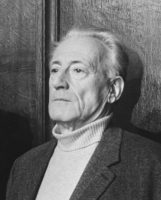Henri Lefebvre
Documents
Keywords
Share
LEFEBVRE, HENRI. THE PRODUCTION OF SPACE. BLACKWELL, 1991.
Publisher’s Introduction
“Henri Lefebvre’s work spans some sixty years and includes original work on a diverse range of subjects, from dialectical materialism to architecture, urbanism and the experience of everyday life. The Production of Space is his major philosophical work and its translation has been long-awaited by scholars in many different fields. The book is a search for a reconciliation between mental space (the space of the philosophers) and real space (the physical and social spheres in which we all live). In the course of his exploration, Henri Lefebvre moves from metaphysical and ideological considerations of the meaning of space to its experience in the everyday life of home and city. He seeks, in other words, to bridge the gap between the realms of theory and practice, between the mental and the social, and between philosophy and reality. In doing so, he ranges through art, literature, architecture, and economics, and further provides a powerful antidote to the sterile and obfuscatory methods and theories characteristic of much recent continental philosophy. This is a work of great vision and incisiveness. It is also characterized by its author’s wit and by anecdote, as well as by a deftness of style which Donald Nicholson-Smith’s sensitive translation precisely captures.
Henri Lefebvre began his career in association with the surrealist group, from whom he learned Hegel and a concern with dialectical logic. He was the first to translate Marx’s early manuscripts into French, and his book Dialetical Materialism (published in 1938) became the work from which several generations of French intellectuals learned Marxism. Immediately after the war, Lefebvre began to reflect on a new object of study which he called “daily life”. After the publication of Everyday Life in the Modern World, he was drawn to the analysis of urbanism, and wrote several books on the city, including Space and Politics(1972). In the 1960s he became closely involved with the younger school of French architects, and provided a theoretical framework for their work. Finally, the accumulation of these diverse themes led to his major philosophical work, The Production of Space.”


